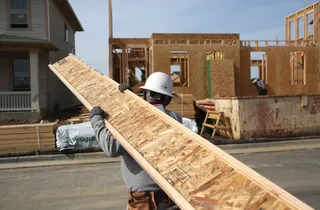How to Stay Safe and Cool During a Heat Wave
Stay safe as temperatures climb.

1 / 16
Getting Relief From the Elements - A record-setting heat wave and drought was blamed for causing a brush fire that took the lives of 19 firefighters in Arizona nearly three weeks ago. According to reports, at least 30 more deaths have resulted from scorching temperatures across the Northeast and Midwest in recent weeks. Keep reading for heat wave safety tips from the American Red Cross as well as easy ways to keep cool during dangerously high temperatures. — Britt Middleton (Photo: Jamie Squire/Getty Images)

2 / 16
Preparing for a Heat Wave - During the summer months, it’s especially important to stay current with local weather forecasts and stay aware of upcoming temperature changes. Make sure your family's emergency kit (packed with water, non-perishable foods, first aid supplies, batteries, flashlights and other items) is stocked in the event there is a blackout. (Photo: Teri L Stratford/Getty Images)

3 / 16
Tune In - In addition, the Red Cross advises listening to NOAA Weather Radio for critical updates from the National Weather Service (NWS). Click here to find a station nearest you. (Photo: Pascal Broze/Getty Images)

4 / 16
Seek Shelter - If you don't have air conditioning at home, seek coverage from daytime temps by going to a public library, movie theater or shopping mall during the hottest hours of the day (typically between 11 a.m. and 3 p.m.). (Photo: Matthew Staver/Landov)

5 / 16
Stay Hydrated - It may seem like a no-brainer, but make sure you stay hydrated with fluids, even when you don't feel thirsty. This can prevent heat-induced illness such as heat stroke, a life-threatening condition in which a person's internal thermostat is compromised and the body cannot cool itself. Avoid drinks with caffeine or alcohol, as they can increase dehydration. (Photo: Cate Gillon/Getty Images)
ADVERTISEMENT

6 / 16
Physical Symptoms - Heat cramps, muscular pains that typically occur in the legs and abdomen after exposure to excessive heat and humidity, are often a warning sign that the body is having trouble dealing with the heat, the Red Cross says. Heavy sweating, nausea and dizziness are noted symptoms of heat exhaustion. (Click here to learn what to do if you think someone may be experiencing heat exhaustion or other heat-related illness.) (Photo: Rob Carr/Getty Images)

7 / 16
Keep Kids Safe - Instead of a play date at the park, bring the kids indoors for a game of hide and seek or story time. Never leave children alone inside an enclosed vehicle, where temperatures can exceed more than 100 degrees in a matter of minutes, according to the NOAA. In May, seven children died from hot cars over a 16-day period, USA Today reported. An estimated 38 die each year, according to the advocacy group KidsandCars.org. (Photo: Tyler Edwards/Getty Images)

8 / 16
Keep Pets Safe - Keep Fido and other furry friends inside during the hottest hours of the day. Never leave pets alone inside an enclosed vehicle. (Photo: LWA/Getty Images)

9 / 16
Exercise Smarts - Slow down, stay indoors and avoid strenuous exercise during the hottest hours of the day. Skip outdoor games and activities if possible. (Photo: Thomas Northcut/Getty Images)

10 / 16
Use the Buddy System - Use the buddy system when working outdoors in excessive heat. Be observant of any physical changes you or your partner feel and take frequent breaks. (Photo: John Moore/Getty Images)
Photo By Photo: John Moore/Getty Images/ John Moore/Getty Images
ADVERTISEMENT

11 / 16
Stay Connected - Stay in touch with family, friends and neighbors who do not have air conditioning, who spend much of their time alone or who are more likely to be affected by the heat. People living in urban areas may be at greatest risk from prolonged effects of a heat wave. (Photo: Blend Images/Hill Street Studios/Getty Images)

12 / 16
Dress for the Weather - Ditch the dark and opt for lightweight, breathable fabrics in lighter colors. Dark colors absorb more of the sun's harmful rays. Avoid wearing tight-fitting clothing. (Photo: Spencer Platt/Getty Images)

13 / 16
Get Misty - For a refreshing pick me up, carry a small water bottle filled with ice or cool water and spritz yourself throughout the day. You can also wrap ice in a napkin or plastic bag and place them on your pulse points, which are your body's quickest cooling points. (Photo: GettyImages)

14 / 16
DIY Air Conditioner - Place a bowl of ice or open cooler in front of a window box fan, aiming the air so that it blows over the ice, creating a cool stream of air. (Photo: GettyImages)

15 / 16
Spice It Up - If you have an adventurous palette, eating spicy foods will make you sweat, which in turn helps your body regulate temperature. (Photo: GettyImages)
